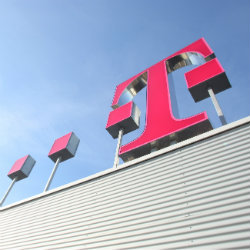
According to network-testing firm Ookla, T-Mobile is not using the Nokia equipment in New York City it inherited from Sprint to broadcast a 5G signal in its 2.5GHz spectrum. Instead, it's turning off Nokia's 5G signal in that spectrum band and using Ericsson equipment to transmit that signal.
However, T-Mobile continues to use Sprint's Nokia equipment to broadcast a 4G LTE signal. And the operator doesn't appear to be removing any Nokia equipment from any of its sites. At least not yet.
The development reflects the complex issues involved in T-Mobile's efforts to combine and unify its network with Sprint's network. It's an undertaking that will stretch across every single cell site owned by the two companies in cities around the country, and will involve equipment from Ericsson and Nokia (T-Mobile's 5G equipment vendors).
However, T-Mobile is not offering any details about exactly how it will go about that work. What the company does in NYC might not be the same as what it does in other cities.
"Sprint and T-Mobile both like(d) to run with a primary vendor in a particular area so I wonder if you are not seeing some early rationalization going on with the 5G network," speculated analyst Chris Nicoll with ACG Research.
That said, T-Mobile's decision to stop using Nokia equipment for 2.5GHz 5G in the most populous city in the US is not a positive development for the vendor. And that's noteworthy considering Nokia delayed the launch of Sprint's initial 5G network.
As Light Reading reported last year, Sprint had intended to launch 5G in its midband spectrum across nine markets by July 2019. The operator selected three vendors for the effort: Ericsson, Samsung and Nokia. Ericsson built Sprint's 5G networks in Dallas, Atlanta, Houston and Kansas City; those markets launched at the end of May 2019. Samsung's market, Chicago, launched in July 2019. Nokia's markets missed Sprint's July launch goal, but did launch shortly thereafter.
"While we can't speak to T-Mobile's detailed 5G plans, Nokia is actively working with T-Mobile for its ongoing 5G buildouts," a Nokia spokesperson wrote to Light Reading this week in response to questions about Ookla's findings. Officials from Ericsson and T-Mobile declined to comment on the topic.
T-Mobile split its initial $7 billion 5G equipment contract, announced in 2018, evenly between Nokia and Ericsson.
High-stakes buildout
How T-Mobile goes about integrating its network with Sprint's network is worth billions of dollars. Indeed, T-Mobile has pledged to spend $60 billion over the next five years building a network spanning all of its spectrum bands, including the valuable 2.5GHz midband spectrum it acquired from Sprint. And it appears that Nokia and Ericsson will reap the bulk of that spending considering T-Mobile isn't using equipment from Samsung and isn't planning to make use of open RAN technologies.
Specifically, T-Mobile has said it will decommission roughly 35,000 cell sites, mostly those it inherited from Sprint, and will concurrently build around 10,000 new cell sites, mostly in suburban and rural areas. When that's all said and done in the next two to three years, T-Mobile expects to manage roughly 85,000 total cell sites, which will be a reduction from the 110,000 it currently owns across its T-Mobile network and its Sprint network.
But how that work will involve equipment from Nokia and Ericsson is not something T-Mobile officials will provide publicly. For example, the operator may be relying primarily on Ericsson equipment in NYC but will use Nokia equipment in other cities.
Supercharged performance
Regardless of the equipment in play, it's clear that T-Mobile customers should expect much speedier connections as a result of the work.
As reported by Ookla, T-Mobile's mean download speeds in NYC increased from 79 Mbit/s in January 2020 to 99 Mbit/s in May 2020, after it switched on its 5G spectrum "layer cake" in the city. The firm noted the move increased T-Mobile's download speeds by 25% and upload speeds by 11%.
But that's just the beginning. As the firm noted, T-Mobile ought to be able to increase speeds and capacity much more as it builds out its network and devotes more of its spectrum holdings to 5G. "Two weeks of testing T-Mobile's 5G in New York City delivered an impressive user experience, and it was just an early taste of a 5G layer cake that could continue to improve," Ookla's Milan Milanović wrote. "Lowband 5G provides the foundational layer of the cake, the midband filling is already thickening and the mmWave [millimeter wave] at the moment is the cherry on top, with the potential to become a much bigger layer."
— Mike Dano, Editorial Director, 5G & Mobile Strategies, Light Reading | @mikeddano
About the Author(s)
You May Also Like











